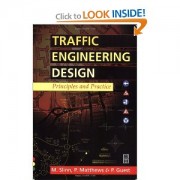Traffic Engineering Design
1.1 The original version
In 1970, the first version of this book,1 written by Gordon Wells was published as an introduction to the then relatively new subject of traffic engineering. Since that date the book has been twice updated by the original Author who produced the last volume in 1978. However, in the last two decades the range of skills required by the modern traffic engineer has developed virtually beyond recognition and it became clear to the publishers that the book needed rewriting.
Gordon Wells has now moved on and in 1998 the current authors published a new version of this book. However in a little over 5 years the world of traffic engineering has moved on and an update was over-due. Therefore a new and extended version has been prepared to keep up to date with current practice.
The purpose of this volume has always been to provide the reader with a basic understanding of the range of skills and techniques needed by the modern traffic engineer.
This book is an introduction to the subject and as such cannot be exhaustive. Our objective is to provide an introduction to the skills required and to direct the reader to authoritative source mater- ial for a more detailed understanding of the subject. Indeed, techniques are developing so rapidly in some areas that some parts of the book may be quickly be superseded by new techniques, par- ticularly in the appliance of technology, almost before the book is published. However, we, the authors, as practitioners, have sought to set out the basics in a clear and easy to understand style.
1.2 What is traffic
Traffic can be defined as the movement of pedestrians and goods along a route, and in the 21st cen- tury the biggest problem and challenge for the traffic engineer is often the imbalance between the amount of traffic and the capacity of the route, leading to congestion. Traffic congestion is not a new phenomenon. Roman history records that the streets of Rome were so clogged with traffic, that at least one emperor was forced to issue a proclamation threatening the death penalty to those whose chariots and carts blocked the way. More recently pictures of our modern cities taken at the turn of the century show streets clogged with traffic.
What do we mean by traffic in the context of this book? The dictionary describes ‘traffic’ as the transportation of goods, coming and going of persons or goods by road, rail, air, etc. Often in common usage we forget this wider definition and colloquially equate the word with motorised road traffic, to the exclusion of pedestrians and even cyclists. Traffic engineering is concerned
Download PDF File Traffic Engineering Design










